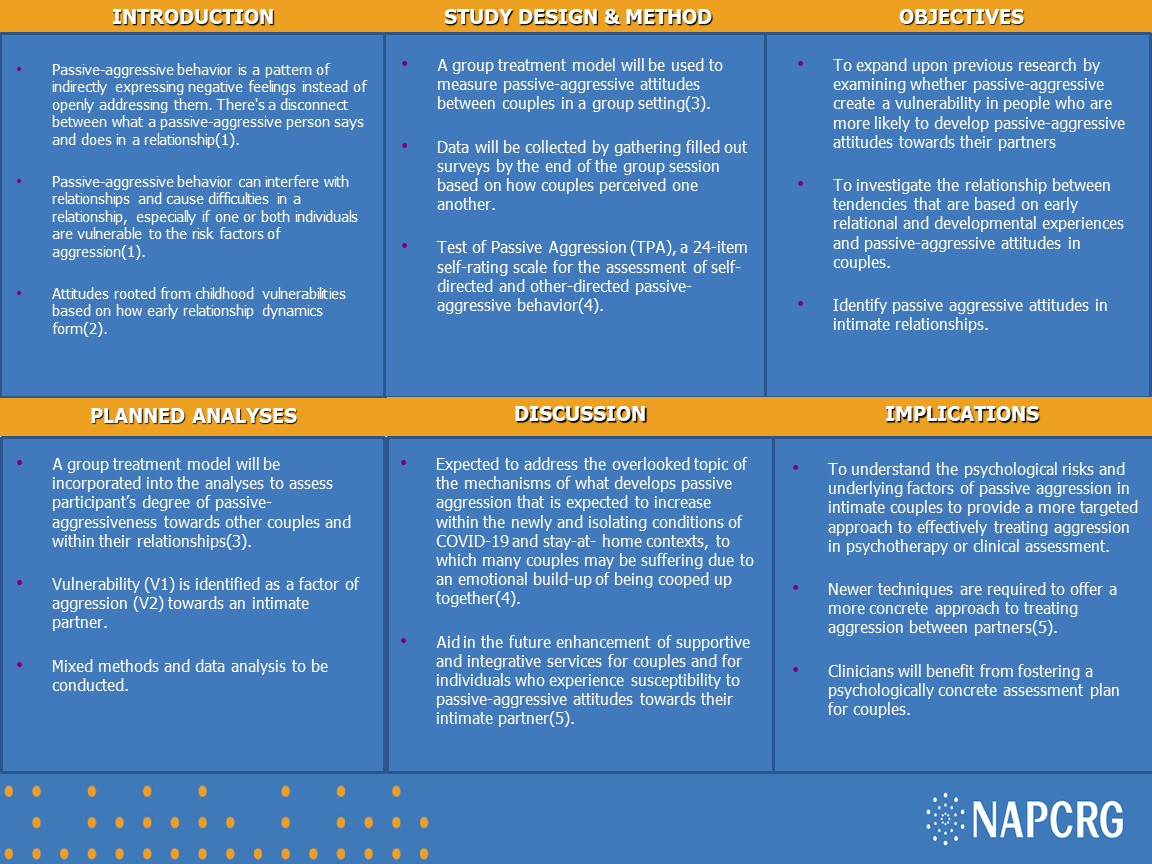PRP061: Passive Aggression: A relational investigation into Assessing how intimate couples communicate
Justin Brass, BA
Abstract
Passive aggression is the indirect expression of anger by someone who is uncomfortable or unable to express his or her anger or hurt feelings honestly and openly. Prior scholarship has long established that passive aggression is highly influential in how intimate couples develop their underlying mechanisms and psychological outcomes of relationship success, and how to effectively communicate with each other. The objective of the intended study is to understand how passive-aggressive tendencies that are based on early relational and developmental experiences create a vulnerability in people who then become exposed to a higher degree of passive-aggressive attitudes towards their partner. It is anticipated that the findings from this study will be fundamental in presenting an integrative treatment approach and exemplify newer methods of refining interventions to meet the needs of individuals and couples. In addition, a group treatment model will be incorporated into the study to assess a participant’s degree of passive-aggressiveness towards other couples and within their relationships to examine vulnerability as a factor of aggression towards an intimate partner.
This research is expected to address the overlooked topic of the mechanisms of what develops passive aggression that is expected to increase within the newly and isolating conditions of COVID-19 and stay-at-home contexts, to which many couples may be suffering due to an emotional build-up of being cooped up together. The need for this research is paramount as clinicians and psychotherapists will need to learn more about how to conceptualize passive aggression, as this understanding is essential for fostering a psychologically concrete assessment and treatment plan for couples. In turn, it is expected that this study will aid in the future enhancement of supportive and integrative services for couples and for individuals who experience susceptibility to passive-aggressive attitudes towards their intimate partner. The broader scope of this work will be to understand the psychological risks and underlying factors of passive aggression in intimate couples to provide a more targeted approach to effectively treating aggression in psychotherapy or clinical assessment. In doing so, clinical implications will be discussed to make the argument that newer techniques are required to offer a more concrete approach to treating aggression between partners. All data will be fully collected for the conference.
This research is expected to address the overlooked topic of the mechanisms of what develops passive aggression that is expected to increase within the newly and isolating conditions of COVID-19 and stay-at-home contexts, to which many couples may be suffering due to an emotional build-up of being cooped up together. The need for this research is paramount as clinicians and psychotherapists will need to learn more about how to conceptualize passive aggression, as this understanding is essential for fostering a psychologically concrete assessment and treatment plan for couples. In turn, it is expected that this study will aid in the future enhancement of supportive and integrative services for couples and for individuals who experience susceptibility to passive-aggressive attitudes towards their intimate partner. The broader scope of this work will be to understand the psychological risks and underlying factors of passive aggression in intimate couples to provide a more targeted approach to effectively treating aggression in psychotherapy or clinical assessment. In doing so, clinical implications will be discussed to make the argument that newer techniques are required to offer a more concrete approach to treating aggression between partners. All data will be fully collected for the conference.

Diane Harper
harperdi@med.umich.edu 11/21/2021Thank you for sharing with us at NAPCRG.